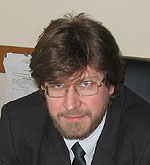© «Russia in
Global Affairs». № 3, July — September 2008
 There is an
There is an
anticipation of change in the world today, although no one can say
exactly how things will change. This anticipation stems from the
handover of power – already accomplished in Russia and which will
soon take place in the United States; from new internal turbulence
in the European Union; from the marked growth of China’s presence
on the global stage; and from ever new signs of a crisis in various
international institutions. All these factors bring about a general
feeling of uncertainty but, at the same time, an underlying desire
for something new – new institutions, new alliances and new types
of mutual relations. For now, this is no more than a feeling,
although it soon may take a clearer shape, considering the rapid
developments in the modern world.
Russia’s Foreign Minister Sergei Lavrov in his article rethinks
the international situation and Russia’s place in it.
“Psychologically, it is easy to understand those who wish to leave
everything the way it is, in order to die in the Europe or the
America in which they were born,” he writes. However, “the rapid
changes do not allow such a luxury,” he adds.
Alexei Arbatov comments on an article published in our previous
issue and offers his own explanation of why the world system has
lost its stability and how it can be restored.
Mark Entin and Andrei Zagorsky offer an in-depth analysis of the
Organization for Security and Cooperation in Europe – the structure
which underlay the former European order and which is now in an
obvious crisis. The authors argue that the organization’s potential
has not been fully tapped yet and that it still can be useful to
meet Russia’s interests. Arkady Dubnov writes about how another
post-Soviet country – Kazakhstan – is trying to have the OSCE serve
its interests. In particular, Astana will preside over the OSCE in
2010.
Azhdar Kurtov focuses on China which has been skillfully and
very consistently consolidating its political and economic
positions wherever it finds it necessary, specifically in Central
Asia.
Rafael Khakimov proposes tapping a resource that has been little
used in Russia’s foreign policy – namely, the Islamic factor, which
the author argues has great potential.
Pavel Zolotarev turns to the history of the most controversial
international project of recent time – missile defense. He believes
that there still is a chance to turn missile defense from a bone of
contention into a basis for constructive cooperation between
Russia, the U.S. and the European Union. Sergei Markedonov analyzes
the strategic positions of Azerbaijan, which has also been involved
in missile defense discussions. Sergei Minasyan writes about the
regional aspects of Russia’s desire to withdraw from the Treaty on
Conventional Armed Forces in Europe. He believes that this
decision, should it be made, would have a strong impact on security
in the South Caucasus.
Yuri Golotyuk raises a very “cold” subject which is expected to
become a “hot” problem – Russia’s efforts to ensure its sovereignty
in the Arctic. Growing competition for resources in that region and
global warming have added to the importance of the issue.
Toby Gati writes about Russia’s huge potential in the area of
renewable energy. Angel de la Vega Navarro discusses whether global
regulation is possible on the world energy market, while Nodari
Simonia focuses on “energy animosity” between the EU and
Russia.
Vyacheslav Morozov analyzes how the European Union has changed
over the last two decades and why its relations with Russia are so
complicated today. In his view, the difficulty stems from the fact
that Moscow and European capitals are guided by different logic,
above all a historical one. Anatoly Torkunov writes about the
difficulties of “historical policy.” The same subject is analyzed
in detail by Alexei Miller. Valery Tishkov focuses on the national
identity issue and on how this identity evolved in different
periods of Russian history. Olga Tynyanova argues that the unity of
the Russian Federation still does not have a solid institutional
and legal foundation, but rests, above all, on political
factors.
Our next issue will focus on the future of Russian-U.S.
relations, on a possible model for Russia-EU integration, on the
prospects for interaction between Russia, India and China, and on
other issues.










